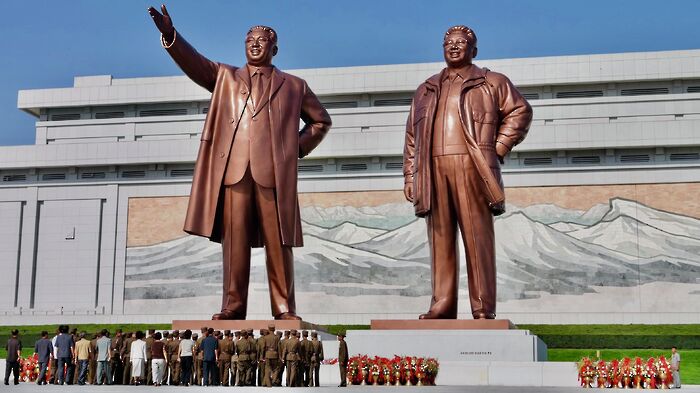The mainstream media are complicit in Palestinian marginalisation
Our writer calls for a more nuanced and inclusive discussion on the Israel-Palestine conflict following Trump’s recognition of Jerusalem as the capital of Israel

On 6th December 2017 Trump’s official recognition of Jerusalem as the capital of Israel reminded the public once more of one of its most tragic political conflicts. Western pundits and terror specialists abounded in their commentary. Yet despite their expertise the coverage left much to be desired.
Under the title ‘Differing views on Jerusalem as a capital’, one highly problematic Guardian article displayed the following breadth of opinions: “Palestinian claims to Jerusalem as their capital have no basis in fact or history, says Joshua Rowe. Trump and Netanyahu know the West’s response is all wind and fury, says Christopher Sterling. It’s hard to argue with Israel’s assertion that Trump is simply acknowledging the reality, says Leon Rosselson.”
“The need for a concerted call for a withdrawal to the 1967 borders… is more important than ever before”
Conversely, the Arab response – or, more appropriately, its backlash – was surmised under the rubric of Palestinian calls for a ‘day of rage’. As one BBC headline put it: ‘Violence over Trump Jerusalem move’. For highbrow readers of Haaretz and The Guardian this discourse was translated as a risk of terrorism or an intifada. And who was to know better? As Edward Saïd put it, in the media “Arabs almost always play the role of terrorists and violent people”. That since Trump’s declaration dozens of Palestinian protesters have been shot, and over six hundred people imprisoned by military tribunals, does little to alter this narrative of violence. To use the title of Nathan Thrall’s book, force is the only language they understand. Although discontent with the representations of Palestinians in mainstream media was expressed in several news outlets, such as The Intercept and Al Jazeera, this was generally ignored.
Amid the many perspectives that graced the Anglophone media, Arab voices were the least heard. For those of us descended from the over 700,000 Arabs who fled in 1948, the inaudibility of our narrative in the media is the hardest to bear. Palestinian claims over East Jerusalem have been portrayed as one dubious claim among many. Established statutes of international law concerning the illegality of the occupation often ended with the caveat “claimed one Palestinian official”. The story of Israel and Palestine was reported as it has been for decades: so ancient as to make a full recounting of the details impossible, so complicated as to make a moral judgement inappropriate, and yet so mired by the poignancies of the present-day that we are still left mumbling our tired platitudes – “Why can’t they just sort it out?”
In the midst of this confusion, the Palestinian story has not been told: a story that encompasses the half-century of occupation, the thousands killed and millions dispossessed. This alone could have made sense of the full emotional weight of Arab dismay, and the true importance of global dismay, at the unfolding events.
Why write about the 6th December now? It is because the silences that characterised the events of that day have not ended. The need for a concerted call for a withdrawal to the 1967 borders, and the end to the construction of colonial settlements, is more important than ever before. Yet public commentary in Britain is far removed from the processes of colonisation that have accelerated with Trump’s inauguration. Many Israeli commentators take seriously the possibility of the annexation of large parts of the West Bank. Former US Ambassador to Israel Daniel Shapiro joined the chorus of critics warning of this possibility. Nevertheless, calls for annexation abound in Israeli government circles. The Jerusalem Post reports that Naftali Bennett, the chairman of Jewish Home, one of the constituent parties of Netanyahu’s coalition government, argued Israel must prepare for the post-Abbas era and decide what is good for the country, which in Bennett’s eyes involves enforcing Israeli sovereignty in the Palestinian lands of Judea and Samaria.
In the face of these considerable political challenges to both the rights of Palestinians and the security of Israelis, it is important that we have an honest analysis and discussion of the ongoing process and influence of colonialism that is underway. For this to be possible, the voices of liberal Palestinians, Arabs and Israelis must be heard loudly. In the absence of such a conversation, the settler colonisation of Palestine will not pause. The vision that moderates have coalesced around for decades – a viable two-state solution – is evaporating from view.
The Palestinian question did not end on the 6th December. There is a frank discussion to be had. My hope is that such a discussion may not only compel us to acknowledge our common humanity, but also to discern the politics that stand in its way
 News / Candidates clash over Chancellorship25 April 2025
News / Candidates clash over Chancellorship25 April 2025 Music / The pipes are calling: the life of a Cambridge Organ Scholar25 April 2025
Music / The pipes are calling: the life of a Cambridge Organ Scholar25 April 2025 Interviews / Dr Ally Louks on going viral for all the wrong reasons25 April 2025
Interviews / Dr Ally Louks on going viral for all the wrong reasons25 April 2025 News / Cambridge professor paid over $1 million for FBI intel since 199125 April 2025
News / Cambridge professor paid over $1 million for FBI intel since 199125 April 2025 Comment / Cambridge builds up the housing crisis25 April 2025
Comment / Cambridge builds up the housing crisis25 April 2025






